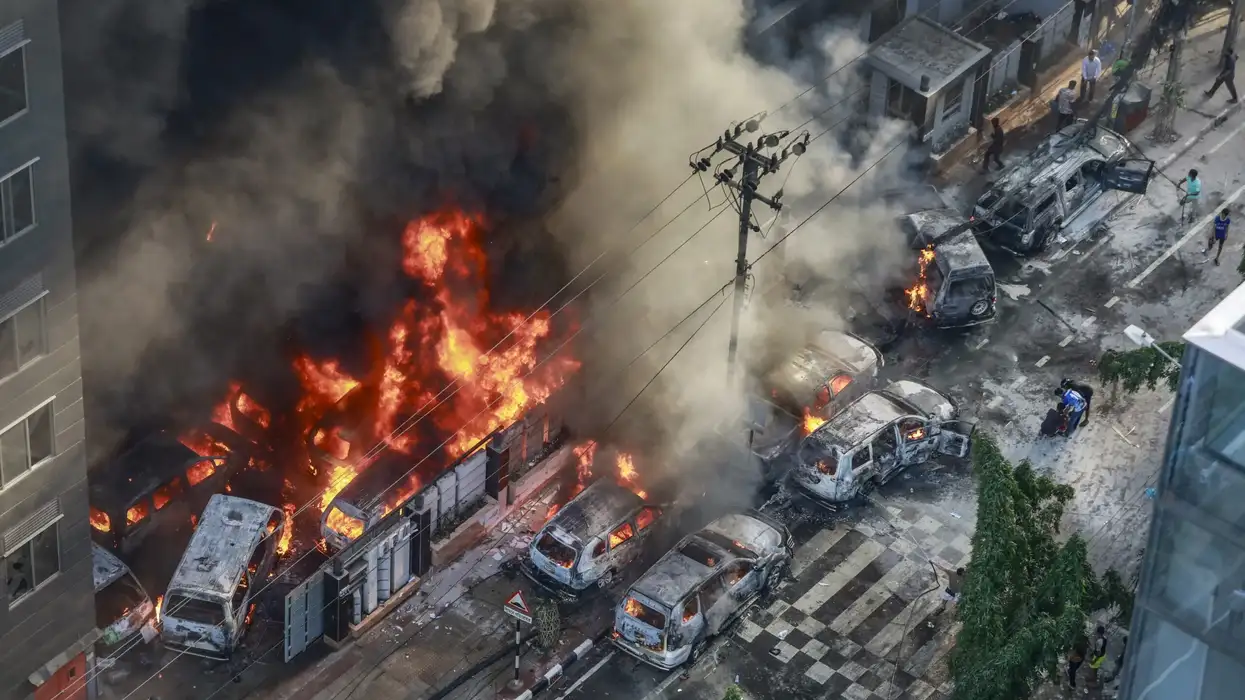Police in Bangladesh's capital Dhaka banned all public rallies on Friday following the deadliest day of student protests, during which government buildings were torched, and a nationwide internet blackout was imposed.
This week's unrest has resulted in at least 39 deaths, including 32 on Thursday. Clashes have been reported in nearly half of the country's 64 districts, suggesting the toll may rise.
Sparked by student anger over the controversial quotas, the protests are also being fuelled by economic issues, including high inflation, rising unemployment, and dwindling foreign exchange reserves, according to some analysts.
On Friday morning, students resumed their protests ahead of planned pro-government counter-demonstrations set to start after midday prayers in the Muslim-majority country.
Dhaka's police force banned all public gatherings for the day, marking the first time such a step has been taken since the protests began, to prevent further violence.
"We've banned all rallies, processions, and public gatherings in Dhaka today," police chief Habibur Rahman told AFP, stating the move was necessary for "public safety."
Dhaka Metropolitan Police spokesman Faruk Hossain told AFP that officers had arrested Ruhul Kabir Rizvi Ahmed, the joint secretary of the main opposition Bangladesh Nationalist Party (BNP).
"He faces hundreds of cases," Hossain said, without providing further details on Ahmed's detention.
Earlier, police in the capital reported that protesters had torched and vandalised numerous police and government offices. Among the affected buildings was the Dhaka headquarters of state broadcaster Bangladesh Television, which remains offline after hundreds of students stormed the premises and set fire to a building.
"About 100 policemen were injured in the clashes yesterday," Hossain told AFP. "Around 50 police booths were burnt."
Hospital staff descriptions suggest police fire caused at least two-thirds of the deaths reported this week.
By Friday morning, the streets around the capital were empty but bore signs of the previous night's chaos, with burnt vehicles and scattered bricks from protesters visible.
Fresh clashes erupted between police and protesters in Dhaka later in the morning. Hundreds of students blocked roads in the Banani district, as witnessed by an AFP correspondent. Police fired tear gas in several areas around the city of 20 million people.
The protests have also revived old and sensitive political fault lines between those who fought for Bangladesh's independence from Pakistan in 1971 and those accused of collaborating with Islamabad.
Among the former are the Awami League, the ruling party led by Hasina, who has labelled the protesters "razakar," a term used for collaborators during the independence era.
Internet shutdown
Clashes were reported in at least 26 districts on Thursday, according to broadcaster Independent Television. The network reported over 700 injuries, including 104 police officers and 30 journalists.
London-based watchdog Netblocks reported a "nation-scale" internet shutdown on Friday, stating that it "prevents families from contacting each other and stifles efforts to document human rights violations."
Recent marches have called for the abolition of a quota system that reserves more than half of civil service jobs for specific groups, including children of veterans from the country's 1971 liberation war against Pakistan. Critics argue the system benefits children of pro-government groups supporting prime minister Sheikh Hasina, who has ruled since 2009 and won her fourth consecutive election in January after a vote without significant opposition.
'Symbol of a rigged system'
Rights groups accuse Hasina's government of misusing state institutions to maintain power and suppress dissent, including through extrajudicial killings of opposition activists. This week, the administration ordered schools and universities to close indefinitely as police intensified efforts to control the deteriorating law and order situation.
"This is an eruption of the simmering discontent of a youth population built over years due to economic and political disenfranchisement," Ali Riaz, a politics professor at Illinois State University, told AFP. "The job quotas became the symbol of a system which is rigged and stacked against them by the regime."
Despite Hasina's national address on the now-offline state broadcaster seeking to calm the unrest, students have vowed to continue their campaign.
"Our first demand is that the prime minister must apologise to us," protester Bidisha Rimjhim, 18, told AFP on Thursday. "Secondly, justice must be ensured for our killed brothers," she added.
(With inputs from AFP and Reuters)





